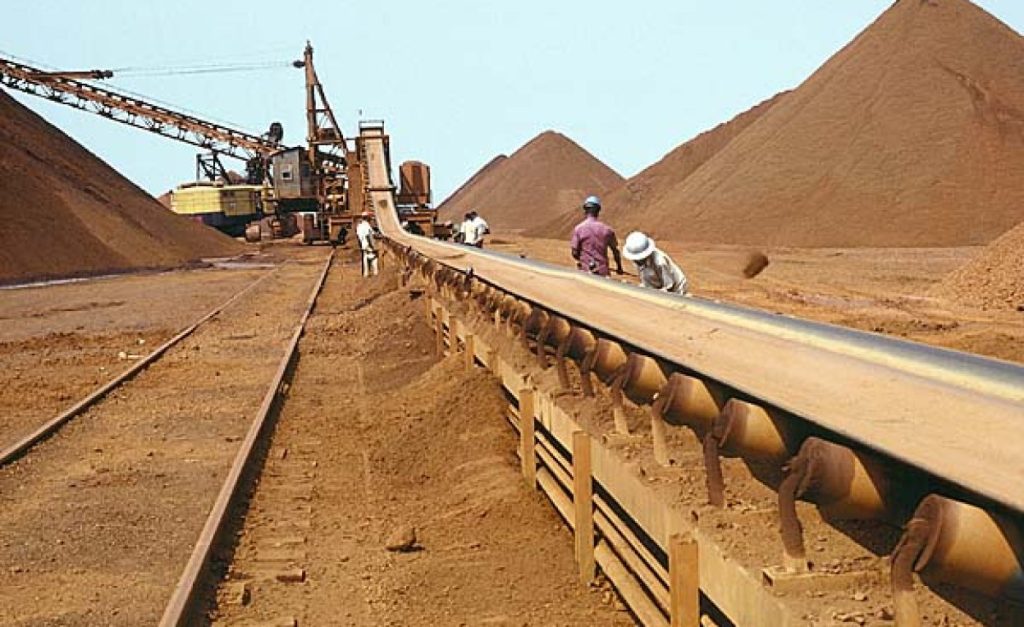Liberia’s Mineral Corridor Gains Strategic Attention From Washington

The iron ore corridor from Guinea to Liberia’s Port of Buchanan is coming into sharper focus as the United States pushes to secure reliable access to critical minerals — a strategic shift that could link the two West African nations mineral corridor to America’s next industrial resurgence.
In Washington, D.C. last week, U.S. Secretary of State Marco Rubio met with Liberia’s Foreign Minister Sara Beysolow Nyanti to discuss deepening bilateral ties and expanding U.S. commercial engagement. According to Principal Deputy Spokesperson Tommy Pigott, the two officials “explored avenues for expanding U.S. participation in Liberia’s critical minerals sector with the aim of creating jobs and economic growth in both the United States and Liberia.”
This meeting essentially echoes sentiments from the meeting with President Trump and President Boakai in July at the White House Summit.
Secretary Rubio, who is also the Statutory Chair of the Millennium Challenge Corporation (MCC) Board, also commended the MCC for its ongoing support to “U.S.-friendly infrastructure projects” — a reference to Liberia’s strategic transport corridor, which is emerging as a key route in West Africa’s minerals logistics.
The discussions come at a moment when U.S. industrial policy — shaped by President Donald Trump’s “America First” agenda and “from aid to trade” Commercial Diplomacy approach– is placing renewed emphasis on high-grade iron ore, the essential feedstock for advanced steelmaking. As reported last week in Newsmax, high-grade iron ore is “the forgotten material” at the heart of America’s manufacturing and defense base — the same metal that built the nation’s railways, warships, and aircraft carriers, and remains vital to modern energy infrastructure.
“Every shipyard, tank plant, and defense contractor in America relies on high-quality steel that cannot be made from low-grade ore or recycled scrap,” in the article published by Newsmax, warning that U.S. defense capacity could be “compromised in weeks” if high-grade ore supplies were disrupted.
That warning has revived interest in projects like Liberia’s Yekepa-Buchanan rail corridor, which could help diversify U.S. access to premium-grade ore while spurring Liberian economic growth.
Ivanhoe Atlantic, a U.S.-headquartered company chaired by former U.S. Special Envoy to the Sahel, Dr. J. Peter Pham, recently signed a landmark Access and Concession Agreement with the Government of Liberia — a deal now heading to the Liberian Legislature for ratification. The agreement grants Ivanhoe the right to invest and access Liberia’s Yekepa-Buchanan railway and port system to transport high-grade iron ore from Guinea’s Nimba Lola region through Liberian territory to the Atlantic.
Dr. Pham, confirmed in a series of posts on X (formerly Twitter) that he and CEO Bronwyn Barnes held “great meetings… updating the U.S. Government on our American company’s critical minerals and related infrastructure investments in Guinea and Liberia,” adding that they appreciated “the huge support from across the entire administration under @POTUS,” a reference to President Trump.
Last week in Washington also saw meetings hosted by the US Africa Critical Minerals Forum at the US Chamber of Commerce. Ivanhoe Atlantic’s Bronwyn Barnes along with the Guinean Minister for Planning and International Cooperation, Ismael Nabe and other notable experts, were on a panel discussing critical minerals supply chain. In an earlier post, Pham noted that Ivanhoe’s project “secures vital high-grade iron ore for America and elevates the Guinean value chain,” underscoring the strategic significance of the U.S.-backed investment.
Under the signed agreement, Ivanhoe is expected to utilize the Tokadeh-Buchanan rail corridor, invest in capacity expansion to move up to 30 million tonnes per annum (mtpa) after the company ramps up from an initial phase 1 plan of 2 to 5mtpa, and construct improved handling and marine logistics capabilities in the port of Buchanan to support its planned operations.
The framework also introduces an independently operated multi-user rail model that will transition to oversight by the National Railway Authority, ensuring open and transparent access to Liberia’s rail and port infrastructure . The President just last week issued a new Executive Order renewing the Rail Authority pending enactment of permanent legislation.
For Washington, Liberia’s corridor is becoming more than a commercial link — it is a strategic supply route. As the Newsmax article observed, “high-grade iron ore is the bedrock of America’s strength,” and both Canada and the European Union have already classified it as a critical mineral. China, meanwhile, consumes nearly 75 percent of the world’s seaborne iron ore and continues to secure deposits across Africa and South America, intensifying global competition.
For Liberia, that competition translates into opportunity. The Boakai administration views the transition to multiuser infrastructure as a platform to modernize transport infrastructure, create jobs, and attract diversified investments beyond iron ore — including lithium, cobalt, and other transition minerals essential to the clean energy economy.
Government officials have emphasized that the multi-user framework is designed to serve not only Guinean ore producers but also Liberian mining companies and future industries that will emerge along the corridor.
By aligning with U.S.-backed investments and governance reforms, Liberia is positioning itself as both a critical minerals partner and a regional transport hub. The challenge now lies in ensuring that this partnership delivers tangible domestic benefits — infrastructure, revenue, and community development — while strengthening the country’s sovereignty over its natural resources.
As one analyst put it, the Yekepa-Buchanan line could soon become more than a railway. It could be the steel spine linking Liberia’s economic future to America’s next industrial revival. Or, as the Newsmax article concluded, “High-grade iron ore is not just another raw material. It is the bedrock of our strength — the foundation of the steel that built and still defends the nation.”
By Liberian Observer.



